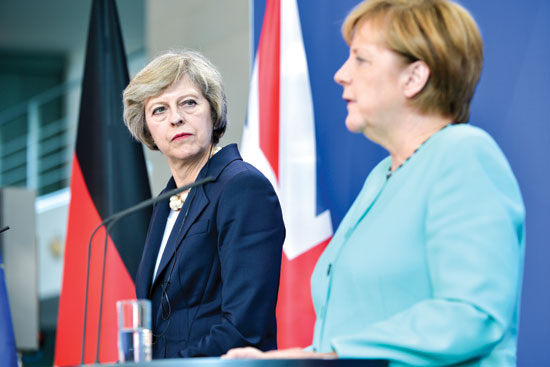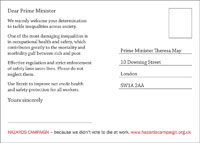

When on 2 September 2016, the Department of Work and Pensions (DWP) announced secretary of state Damian Green’s six picks as new or reappointed Health and Safety Executive (HSE) board members, the short statement revealed the names and not much more.
But something looked odd. Only one, TUC head of organising Kevin Rowan, was a TUC nominee. None of the others were obvious candidates to represent ‘employee interests’.
Hazards asked DWP and HSE if anyone else had been appointed to an employee interests seat on the HSE board. The answer? “Susan Johnson.”
Deliberate snub
It was news that shocked the TUC. “She is not from any trade union, she is not a health and safety activist or a safety representative, she was not nominated by any union body,” TUC head of safety Hugh Robertson confirmed.
“In fact Susan Johnson is a former senior manager and businesswoman. Last year she retired from her job as chief executive of the Durham and Darlington Fire and Rescue Service. Before that she was chief executive of Northern Business Forum, and an ex-director of the food company Greggs.”
He said “there is not anything in her past that remotely qualifies her to speak for workers, yet here she is sitting on the HSE board representing employee interests. How on earth could that happen?”
The HSE board was set up under the Health and Safety at Work Act and has always had three employee seats and three employer seats.
“The Act is very clear,” noted Robertson. “It states that the secretary of state can only make appointments to those three seats after consulting ‘such organisations representing employees as he considers appropriate’.”

MAY DELUGE The Hazards Campaign is reminding the Conservative government that workers need a voice on safety and deserve proper protection. It wants new prime minister Theresa May deluged with postcards and e-cards carrying this message: “Effective regulation and strict enforcement of safety laws saves lives. Please do not neglect them. Use Brexit to improve not erode health and safety protection for all workers.” www.hazardscampaign.org.uk/postcard
And in the UK, that means the TUC “and the government has always accepted that.”
A DWP spokesperson confirmed to Hazards that Susan Johnson was selected by Damian Green as “an employee representative”.
But she added: “The HSE Board appointments were advertised widely, including to organisations representing employees as required by the Health and Safety at Work Act. We are satisfied that all of the new members bring a strong range of skills and experience to the HSE Board, and the ability to develop further once in post is a key consideration in the appointment process.”
The TUC, however, says not only was it not consulted, it was not aware the employee interests seat was up for grabs.
“What is even more bizarre is that the TUC was not given the opportunity to even suggest candidates for this seat because it was never advertised,” said Robertson.
Two seats were advertised, but then TUC nominee on the board Paul Kenny, until earlier this year general secretary of the GMB union, revealed he would be standing down on 30 September 2016.
What the law says…
Section 2(3)(b) in Schedule 2 of the Health and Safety at Work Act 1974 specifies the requirements for the composition of the Health and Safety Executive board. It states: “The Secretary of State shall appoint three members after consulting such organisations representing employees as he considers appropriate.”
Robertson is adamant. Kenny's employee interests post was not advertised, TUC was not consulted and retired employer Susan Johnson was appointed by DWP without TUC having any opportunity to put forward the name of a someone with relevant experience for the seat.
Robertson told Hazards: “This seems a complete breach of the Health and Safety at Work Act, but it is more than just the government breaking the law, they are attacking the very principles on which the Act was built, which are cooperation and social partnership.”
There had been warning signs; DWP had bypassed TUC on an earlier employee interests board position.
Three years ago, TUC nominee Matt Wrack, the eminently qualified general secretary of the firefighters’ union FBU, was snubbed by the secretary of state in favour of newly reappointed Jonathan Baume, the retired former head of the FDA, the union representing top Whitehall mandarins and whose application was not supported by the TUC or any union.
So long, partner
The TUC says there are clear reasons behind the government decision to ignore established processes and, it appears, the law. The first is that the Tories do not understand how social partnership works, or if they do, they hold it in contempt.
“The principle of giving employers and unions an equal voice in the oversight of the HSE was enshrined in the Health and Safety at Work Act and came from the understanding that health and safety issues are best dealt with by those who know the workplace and the risks working together.
“If a decision has the support of both unions and employers then it is more likely to be seen as being a good thing in the workplace.”
The government has indicated it instead wants a ‘professional board’ for the HSE.
“I am not sure exactly what that means, but from the appointments made over the past few years, it seems to suggest someone who is a retiree and/or consultant, often with other ‘non-executive’ roles on the boards of other public bodies or companies,” said Robertson.
A ‘register of interests’ entry by Susan Johnson on HSE’s website reveals she has at least four other current paid directorships.
And she has company. All but one of the other 10 members of the HSE’s new board is from an employer background, and all but one has other paid director-level positions.
The exception is TUC’s Kevin Rowan. The former shipwright, draughtsman and trade union officer has no directorships and just one source of income – his job at the TUC.
| HSE gets the bosses on board | |
| All but one of the 11 members of the HSE’s board from 1 October 2016 is from an employer background, and all but one has other paid director level positions. | |
| • | Martin Temple, the chair of the HSE board, is also paid by a hospital trust and is a former vice-president of steel firm Avesta and former director-general and chair of the manufacturers’ lobby group EEF. |
| • | Susan Johnson is a former chief executive of the Durham and Darlington Fire and Rescue Service and Northern Business Forum, and an ex-director of the food company Greggs. She has at least four other current paid directorships. |
| • | George Brechin is another retired employer and has two other paid directorships. |
| • | Nick Baldwin is chair of the Office of the Nuclear Regulator and former chief executive of Powergen. |
| • | Jonathan Baume has three other paid roles on government agencies. |
| • | Isobel Garner was a local authority chief executive and has two other paid board positions. |
| • | Martyn Thomas is a former business owner and partner at Deloitte Consulting and holds one other paid directorship. |
| • | Sarah Pinch is managing director of her own communications agency. |
| • | Ken Robertson is a senior executive with oil firm Centrica and has personal or family links to several oil-related firms. |
| • | Janice Crawford was director of UK Engineer Operations and a senior executive with Foster Wheeler Energy and is a paid regional director with Network Rail. |
| • | The one exception is TUC’s Kevin Rowan, who has no other paid directorships or financial interests. |
Not seen, not heard
Hugh Robertson believes the new approach will create a more ‘compliant’ HSE board. “A board that will not challenge them on their deregulatory agenda and who will help them manage the 45 per cent cut in government funding over ten years.”
The board is not only getting less representative, it is becoming less invisible, with most board decisions now taken behind closed doors.
In 2010, the year after the Conservatives ousted the Labour government, ten HSE board meetings were public. But then HSE’s openness started to evaporate. By 2014, HSE was holding just eight board meetings in public. In 2015, it fell to 6. In 2016, just two HSE board meetings will be open.
Bye bye EU, bye bye safety?
Most of the laws that protect us at work had their origins in Europe. But the three prominent pro-Leave ministers Theresa May has charged with getting Britain out of the EU will have free trade and not safe workplaces on their agenda. more
TUC is concerned that the board changes are part of the wholesale shift to a less accountable, more malleable HSE.
“Just last year the HSE abolished the body that gave advice on dangerous substances. This was a joint committee with union and employer representatives and it was very effective, but often gave the HSE advice that they did not want,” said Robertson.
“It has now been replaced by a handpicked ‘scientific’ committee with no union or employer voice. A wide range of other joint committees have also been abolished by the HSE.”
He added that outside the HSE, “we have recently seen trade union nomination rights for seats on the board of the Gangmasters Licensing Authority abolished.”
Robertson believes the changes should be seen in the context of the wider ideological attack on trade unions.
The government has “already attempted through the Trade Union Act, to reduce the time given to health and safety representatives in the public sector, even though this is a legal right and despite the irrefutable evidence that trade union health and safety representatives make workplaces much safer.
“Appointing a retired employer to represent workers on the board of the HSE not only ignores the requirements of the Health and Safety at Work Act, it is a kick in the teeth for every worker in the country.”
Au revoir EU, bye bye safety?

Most of the laws that protect us at work had their origins in Europe. Hazards editor Rory O’Neill warns that the three prominent pro-Leave ministers Theresa May has charged with getting Britain out of the EU will have free trade and not safe workplaces on their agenda.
Once outside the EU, don’t expect welfare, wages and working conditions to be high among on the UK’s priorities in any new new trade deals. Boris Johnson, the new foreign secretary, David Davis, who is in charge of Brexit negotiations and Liam Fox, the new international trade secretary - are all arch free marketeers.
The possibility of the UK soon turning its back on the proven protection provided by EU health and safety regulations could mean workers will need an alternative set of rules to protect them, the TUC has indicated.
The union body says the ‘Three Brexiteers’ will have as a priority negotiating a flurry of new trade agreements. Existing trade deals have included the ‘core’ International Labour Organisation (ILO) standards on freedom of association, freedom from forced labour, child labour, and freedom from discrimination. But the TUC wants any new deals to go beyond this, and also include explicit health and safety provisions.
The TUC says the UK, however, has so far only ratified three of the ILO’s 13 safety conventions. Of the three fundamental safety conventions - Occupational Safety and Health Convention (C155), the Occupational Health Services Convention (C161), and the Promotional Framework for Occupational Safety and Health Convention (C187) – the UK has only signed up to the latter.
Outlining the challenge facing unions, TUC’s Hugh Robertson said: “Given the discussions on what kind of agreements Britain will have with both the EU and other international trading partners post-Brexit, we need to start demanding that Britain commits to ensuring that trade agreements include provisions that both parties will ensure that all international labour conventions are adhered to and that, at the same time, the UK signs up to all those that it so far has not ratified.”
ROTTEN BOARD
Who does the secretary of state for work think should speak for workers on the Health and Safety Executive board? The answer? A company director.
| Contents | |
| • | Introduction |
| • | Deliberate snub |
| • | So long, partner |
| • | HSE gets the bosses on board |
| • | Not seen, not heard |
| Related story | |
| • | Au revoir EU, bye bye safety? |
Hazards website
• Vote to die
• Deadly business
• Safety pimp
